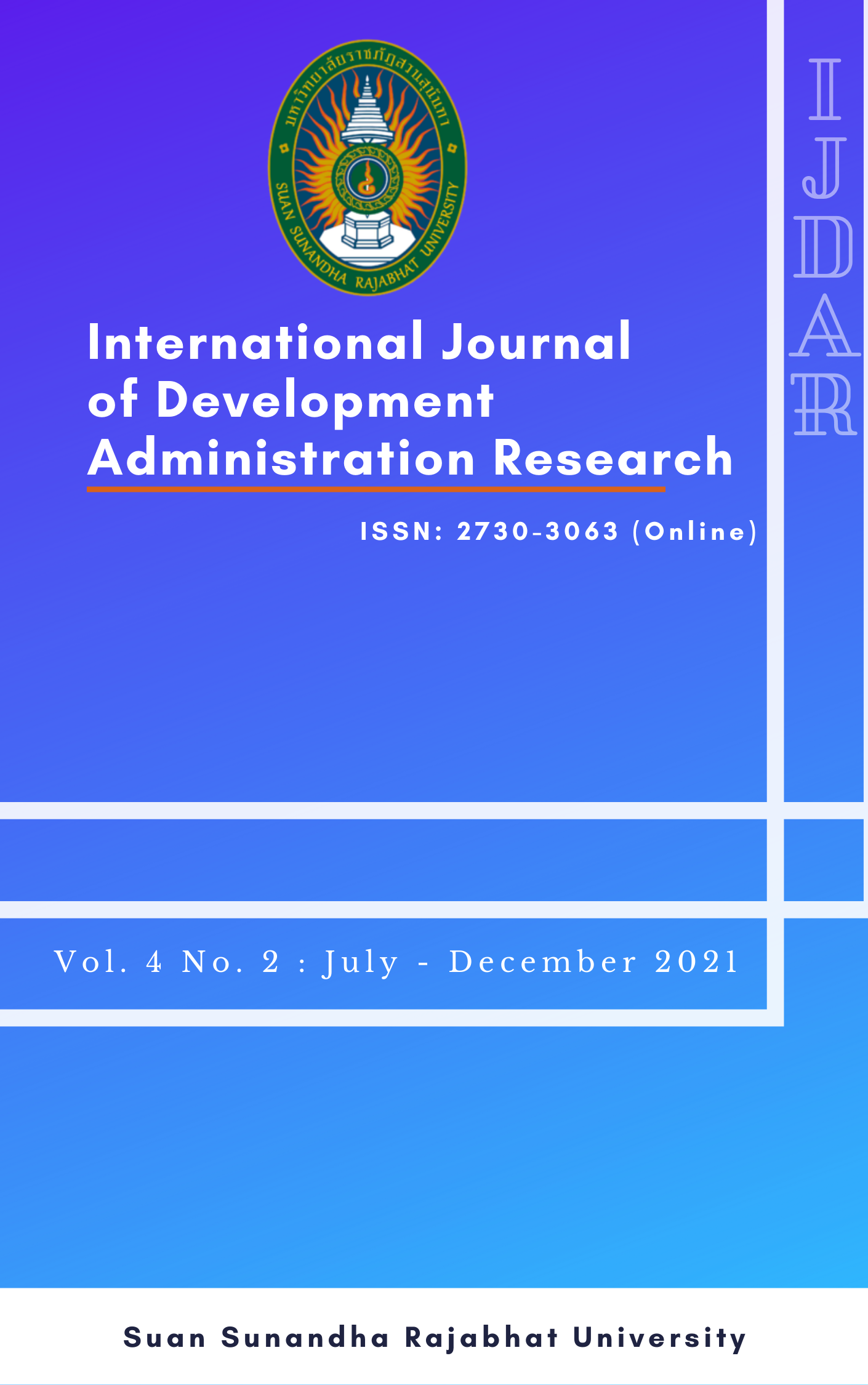Development local product of the Small and Micro Community enterprise in Thailand
Main Article Content
Abstract
The purpose of this research is to investigate the impact of product commercial marketing, quality enhancement, Local product standards and Perceived quality on the customers’ intention to revisit and satisfaction as a mediator in these relationships considering the case example of local products in the community enterprise in Thailand, which is a sub- district and is an important tourist destination. For this purpose, a theoretical framework was established and accordingly, six hypotheses were formulated. The research was carried out by collecting cross- sectional data using a sample of 300 tourists which was selected using purposive sampling technique. Survey method was employed and the sample participants were given questionnaires to fill which consisted of items taken from previously validated scales on these variables. The analysis was done using path modeling. The results proved that these variables have a significant impact on the tourist intention to revisit and that tourist satisfaction acts as a significant mediator in these relationships. Thus, the hypotheses for the study were accepted. This study has theoretical Implications as it has reinforced the results of theory and previous studies by revealing the mediation effect of tourist satisfaction. The study is fruitful for the policy makers of the tourism industry who can apply these results practically and aim to improve the standards of the local product to improve the needs response of tourist so that the fee satisfied and revisit the destination. This can lead to improvement in the revenue from the tourism industry and will help the economy grow.
Article Details
License Terms
All articles published in this journal are licensed under the Creative Commons Attribution–NonCommercial–NoDerivatives 4.0 International License (CC BY-NC-ND 4.0).
Under this license, users are permitted to:
- Share — copy and redistribute the material in any medium or format.
Under the following conditions:
- Attribution (BY)
Users must give appropriate credit to the author(s) and the journal, provide a link to the license, and indicate if any changes were made. Attribution must not suggest endorsement by the author(s) or the journal.
- NonCommercial (NC)
The material may not be used for commercial purposes. Any use primarily intended for or directed toward commercial advantage or monetary compensation is prohibited without prior written permission from the copyright holder.
- NoDerivatives (ND)
If users remix, transform, translate, adapt, or build upon the material, they may not distribute the modified material. The work must be shared in its original and unaltered form.
This license ensures that published works remain freely accessible to the academic community and the public, while protecting the integrity of the original research and the rights of the author(s).
For the full legal code of this license, please visit:
https://creativecommons.org/licenses/by-nc-nd/4.0/
References
intention to purchase local community product on E-Commerce website: The case of
One Tambon One Product (OTOP) in Thailand. Paper presented at the 2017 18th
IEEE/ACIS International Conference on Software Engineering, Artificial Intelligence,
Networking and Parallel/Distributed Computing (SNPD).
Kerdpitak, C. (2016). Key success factors of tourist satisfaction in tourism services provider.
Journal of Applied Business Research. 32(4), 1237-1242.
Kaithong, B., & Phongsiri, M. (2020). Similarities or Differences: The Exposure to Media Messages
among Thai-So Women, Kusuman District, Sakon Nakhon Province, Thailand. Journal
of Community Development Research (Humanities and Social Sciences), 13(2), 55-69.
Sitabutr, V., & Pimdee, P. (2017). Thai Entrepreneur and Community-Based Enterprises’ OTOP
Branded Handicraft Export Performance: A SEM Analysis. SAGE Open, 7(1),
2158244016684911.
ul Haq, A., Majeed, A., Magoulas, G. D., & Jamal, A. (2020). Transformative Power of Smart
Technologies Enabled by Advances in AI: Changing Landscape for Digital Marketing
Handbook of Research on Innovations in Technology and Marketing for the Connected
Consumer (pp. 1-17): IGI Global.
Branca, T. A., Colla, V., Algermissen, D., Granbom, H., Martini, U., Morillon, A., Rosendahl, S.
(2020). Reuse and Recycling of By-Products in the Steel Sector: Recent Achievements
Paving the Way to Circular Economy and Industrial Symbiosis in Europe. Metals, 10(3),
345.
Cheng, B. L., Gaur, S. S., & Rahim, R. A. (2020). Factors Leading to Customer Retention in the
High Volume-Low Volume Service Context: Evidence from the Mobile Service Industry.
Asian Journal of Business Research, 10(1), 68.
Kamasak, R. & Cansever, C. (2019). The predictors of sustained competitive advantage: A study
of Turkish leasing industry. International Journal of Business Tourism and Applied
Sciences. 7(1), 39-43.
Kerdpitak, C. (2019). The Effect of Service Leadership, Market Orientation and Service Quality
on Business Performance: Empirical Evidence from the Tourism Industry of Thailand.
International Journal of Innovation, Creativity and Change. 10(1), 390-405.
Martínez, M. P., Cremasco, C. P., Gabriel Filho, L. R. A., Junior, S. S. B., Bednaski, A. V., Quevedo-
Silva, F., . . . Padgett, R. C. M.-L. (2020). Fuzzy inference system to study the behavior
of the green consumer facing the perception of greenwashing. Journal of Cleaner
Production, 242, 116064
Tsiotsou, R. (2006). The role of perceived product quality and overall satisfaction on purchase
intentions. International Journal of Consumer Studies, 30(2), 207-217.
Türkyılmaz, A., & Özkan, C. (2007). Development of a customer satisfaction index model.
Industrial Management & Data Systems.
Abdulla, S. A. M., Khalifa, G. S., Abuelhassan, A. E., & Ghosh, A. (2019). Antecedents of Dubai
Revisit Intention: The Role of Destination Service Quality and Tourist Satisfaction.
Restaur. Bus, 118(10), 307-316.


